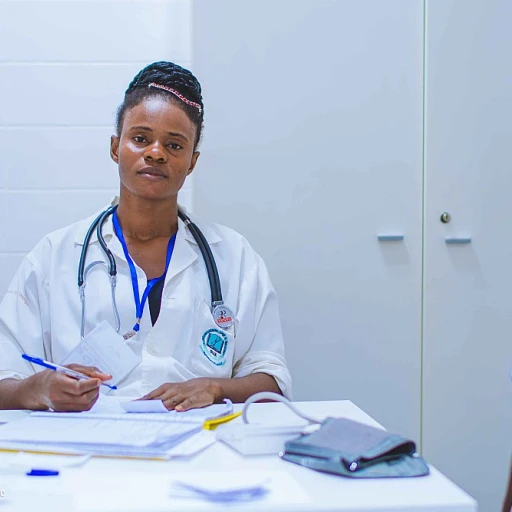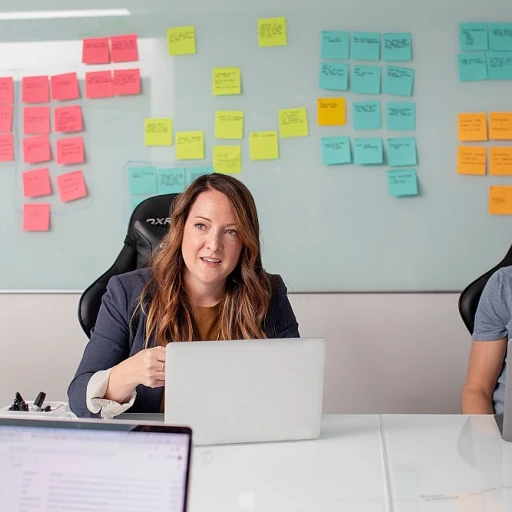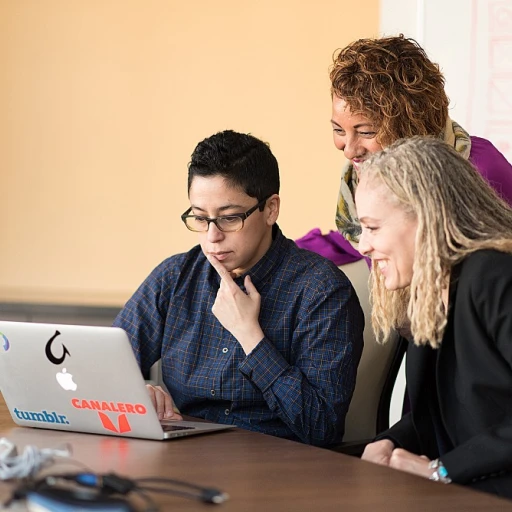Understanding Reflective Practices in Management
Reflective Practices: A Foundation for Effective Management
Reflective practices in management are essential for fostering a culture of continuous improvement and professional development. At their core, these practices involve a deliberate process of thinking about one's actions and decisions to learn and grow from them. This approach is not only beneficial for individual managers but also for the broader educational landscape, including schools and educators.
In the context of career planning and development, reflective practices can significantly enhance a manager's ability to adapt and thrive in dynamic environments. By regularly engaging in reflection, managers can better understand their strengths and areas for improvement, ultimately leading to more informed decision-making and strategic planning.
Reflective practices are particularly valuable in educational settings, such as Chicago public schools, where teachers and staff are continually seeking ways to improve student outcomes. By reflecting on their teaching methods and interactions with students, educators can identify effective strategies and areas needing adjustment. This process not only benefits teachers but also supports student learning and development, contributing to high-quality education.
Moreover, reflective practices can aid in creative problem-solving and decision-making. By analyzing past experiences and considering alternative approaches, managers and educators can develop innovative solutions to challenges they face. This is especially important in environments like CPS, where diverse student needs and evolving educational standards require adaptive and creative approaches.
In summary, understanding and implementing reflective practices in management is crucial for personal and professional growth. Whether in a corporate setting or within public schools, these practices empower individuals to learn from their experiences and enhance their effectiveness in their roles. As we explore further, the role of reflection in decision-making and team development will become even more apparent, highlighting its significance in achieving long-term success.
The Role of Reflection in Decision-Making
Embracing Reflection for Informed Decisions
Reflective practices in management serve as a crucial component for decision-making processes. The ability to effectively analyze past actions and decisions contributes significantly to improving management strategies. Educational institutions, from elementary to high school, often incorporate reflective techniques to aid students in understanding their learning paths and enhance their problem-solving skills. Public schools, especially in Chicago, emphasize critical reflection in both teaching and administrative processes, aligning with the overarching goal of elevating educational standards.
Engaging in reflection allows managers and educators alike to refine their approaches and ultimately make high-quality, informed decisions. For instance, a Chicago Public School principal might review a challenging year by analyzing how particular strategies affected student outcomes. This reflection can play a pivotal role in developing a comprehensive plan for the upcoming school year, ensuring educators are well-prepared to address any potential challenges.
Managers can draw on reflections to identify trends and patterns, often leading to creative problem solving that may not have been apparent during the initial decision-making phase. This cyclical process of reflection and application not only bolsters individual growth but also enhances team development. Incorporating feedback from teachers, staff, and students, an administrator can reevaluate existing strategies, learning from experience to foster a supportive educational environment.
Adopting reflective practices isn't without its challenges. However, understanding the role such techniques play in decision-making equips leaders with essential insights that drive positive change. By viewing reflection as an integral part of professional development, managers create a culture of continuous improvement that benefits not just themselves, but the entire educational community as well.
Enhance your professional journey by recognizing the pivotal role reflection plays in the decision-making process.
Implementing Reflective Techniques
Strategies to Implement Reflective Techniques
For educators in public schools and those involved in high-quality education, incorporating reflective practices into daily routines can significantly enhance professional development. Reflection assists in navigating the complexities of the education system, such as those experienced in Chicago Public Schools (CPS), and fosters an environment conducive to creative problem-solving.
Implementing reflective techniques begins with understanding reflection as a tool, rather than a task. This mindset enables teachers and administrators to genuinely engage with their experiences, irrespective of the grade level or student demographics they work with. Simple steps to incorporate these techniques include:
- Journaling: Encourage educators and students to document their thoughts, challenges, and growth throughout the school year. This written record not only serves as a tool for reflection but also a source to reference when tackling similar issues in future.
- Peer Discussions: Create opportunities for teachers to discuss their experiences collaboratively. School educators can use regular meetings to share strategies that have worked and explore new methods for reaching each student effectively.
- Feedback Loops: Establishing a system where teachers, students, and even families report their observations and experiences can provide a comprehensive view of the learning environment.
By integrating these reflective practices, Chicago teachers and those in other districts aim to improve the teaching process, thereby nurturing a supportive learning environment. In turn, this improves the final ratings for student performance and personal development, making schools a nurturing place for everyone involved.
Overcoming Challenges in Reflective Practices
Recognizing and Addressing Barriers
Reflective practices are undoubtedly potent tools for management development, yet they can encounter various hurdles. Here, we explore some common challenges that leaders, educators, and students may face in their reflective journey.
One primary obstacle is typically time constraints. For professionals in fields such as education, whether in schools or public institutions like CPS Chicago, finding time for reflection amidst a hectic schedule can be daunting. Teachers and school staff often juggle numerous responsibilities throughout the school year, from lesson planning to students' evaluations, leaving little room for reflective practice.
Additionally, embracing reflective approaches requires an openness to vulnerability that not everyone is comfortable with. Engaging in honest self-appraisal and accepting feedback can be challenging for many, yet it is indispensable for genuine professional development and creative problem solving.
To tackle these challenges, schools and educators might consider implementing structured frameworks that integrate reflection into the existing CPS process and professional development plans. For instance, setting aside allocated time specifically for reflection in daily or weekly schedules can help reinforce its importance and encourage consistency.
Moreover, educators and school leaders can promote a supportive environment where students and teachers feel secure to share insights and experiences. Engaging high-quality communication and constructive dialogue fosters an atmosphere conducive to reflective learning and problem solving.
By overcoming these challenges, schools can cultivate an enriching environment that enhances learning and development for students, educators, and leadership alike, leading to a more successful school year.
Reflective Practices and Team Development
Fostering Team Growth Through Reflective Practices
Reflective practices are not only beneficial to individual development but also critical in fostering team growth and cohesion. Within the diverse environments of schools, from elementary to high school, educators, students, and staff must continuously engage in reflection to adapt to the evolving needs of their communities.
The integration of reflective practices into team development starts with creating an open and supportive culture that encourages feedback and open communication among all members, including teachers, students, and even families. By reflecting on experiences from the past school year, educators can assess the effectiveness of their approaches to teaching and learning. This strategy is not unlike the annual review processes seen in professions beyond education, where a reflective report will help in forming new strategies for improvement.
Reflective practices encourage creative problem solving and the development of high quality educational plans that address the unique challenges faced by public schools, such as those in Chicago. As part of this process, teams can evaluate how their educational practices impact student learning and find areas that need improvement to help students reach their full potential.
Consistency in reflection is critical. For optimal results, teams should regularly schedule sessions focused on professional development. These sessions can include discussions on creative solutions to common challenges faced by Chicago public schools and strategies to enhance the overall cps process. It’s important for teachers and staff to continually learn from past successes and setbacks, making these reflective practices a cyclic part of their professional development.
Ultimately, fostering an environment where reflective practices are standard can transform how educators approach learning and teaching. As the team reflects, it’s not just about reviewing what worked or didn’t work; it’s about drawing actionable insights that will guide them in shaping future educational experiences and achieving positive outcomes across all grade levels.
Continuous Learning Through Reflection
Fostering Continuous Learning with Reflective Strategies
Reflective practices serve as a cornerstone for fostering continuous learning in management. When implemented effectively, these practices facilitate growth, adaptation, and in-depth understanding, equipping educators and leaders in public schools to improve school systems and engage students more effectively.
Reflecting on experiences allows educators and managers to evaluate their professional development within the school year. By constantly revisiting processes and outcomes, teams can gauge the effectiveness of their strategies and modify plans accordingly. Creative problem-solving emerges as a dominant theme, especially when tackling complex challenges. Continuous reflection helps educators refine their approach to teaching, making learning more impactful for cps students.
Teachers and staff in Chicago public schools can use reflective strategies to connect subject matter across grade levels, ultimately promoting a cohesive learning environment. For instance, elementary school educators might reflect on their methods and adjust their lessons to accommodate the diverse needs of students' families. Similarly, high school teachers in cps reach initiatives can benefit from periodic reflection on student engagement.
Alongside building individual capabilities, reflective practices facilitate team development. Teachers and leaders alike can share insights and lessons learned, fostering a culture of collective education and improvement within schools. Over time, this collaborative approach will help in addressing issues as they arise, ultimately bolstering the overall quality of education.
Implementing a structured reflection process can ensure the ongoing evolution of teaching methodologies. Schools cps can incorporate reflective checkpoints throughout the school year to evaluate the effectiveness of their strategies, ensure alignment with cps process, and drive creative problem-solving initiatives forward.
In summary, leveraging reflective techniques can lead to high-quality educational outcomes. Not only does it support the pursuit of professional development for educators and leaders, but it also ensures that the chicago education system can adapt to the evolving needs of its students.














